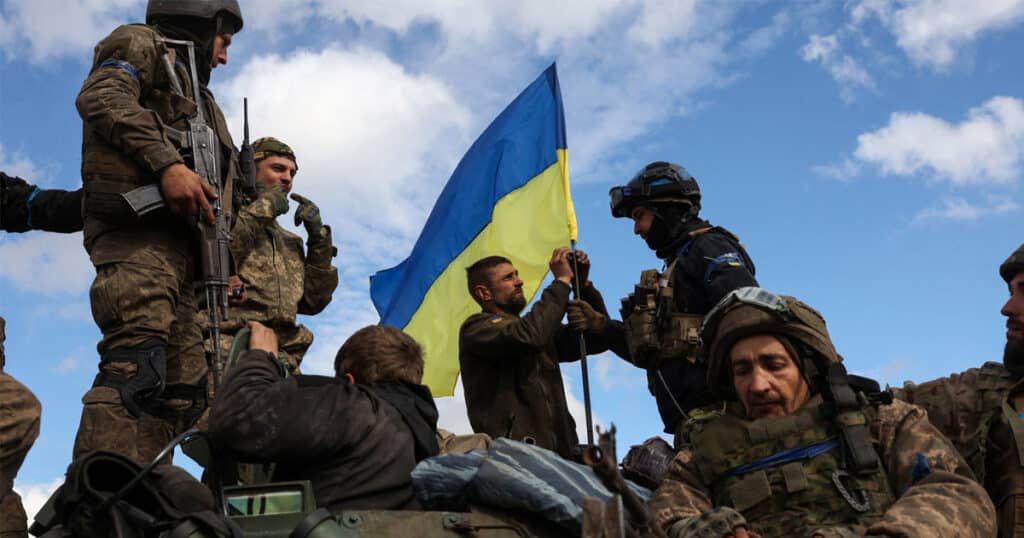
Ukraine’s Hobson’s Choice
CNN, 22 December 2023: Senator JD Vance said on “State of the Union” that it was in “America’s best interests to accept Ukraine is going to have to cede some territory to the Russians.”
Ten days earlier on NBC News, Vance “dismissed fears” that Putin would have any interest in further territorial acquisition because it would be too hard to “conquer all of Ukraine, much less to go further and further west into Europe…“I don’t think the guy’s [Putin] shown any capacity to accomplish these, these imperialistic goals, assuming that he has them.” The senator went on to display ignorance of history: “…there will be negotiations…Ukraine should be willing to give up at least some of its territory to end the war…it ends the way nearly every single war has ever ended: when people negotiate and each side gives up something that it doesn’t want to give up… (The senator did not expand on what he thought Putin would give up in this glorious compromise.)
Dr. Fred Ikle, Under Secretary of Defense under Reagan, agreed that wars must end. In fact, he authored a whole book about that fact titled Every War Must End. But most wars do not end the way Vance wishes. Ever hear of the “Thirty Years’ War” or the “Hundred Years’ War?” Some wars end in total victory, like WWII. Some end with an armistice when both sides are exhausted—but an armistice is not a peace treaty. It’s a cease fire. WWI ended in an armistice, setting the stage for WWII when Germany had secretly rearmed. The Korean War isn’t over—we have a very tense ceasefire that North Korea constantly pushes. PRC did not surrender its designs on Taiwan when it buckled to President Eisenhower’s defense of the island. The American Revolution did end with a treaty, but the king crossed his fingers behind his back and kept on supplying Britain’s Indian allies with arms to fight the new USA, and then came back for another bite at the apple in the War of 1812. Once again, a treaty ended the war, but, as Wikipedia reports, “The Treaty of Ghent completely maintained Britain’s maritime belligerent rights, a key goal for the British, without acknowledging American maritime rights or the end of impressment.”
Senator Vance said, “…No one can explain to me how this ends without some territorial concessions relative to [Ukraine’s] 1991 boundaries.” In 1991, Ukraine was a captive nation, called The Ukraine to emphasize that it was just a region of the Soviet empire, not a country in its own right. It’s worth noting here that former President Barack Obama demands that Israel return to its [indefensible] pre-June 1967 boundaries. Both notions would condemn populations that have already suffered genocide.
Here we should be reminded of Santayana’s dictum: Those who do not remember history are doomed to repeat it.
By 1938, the British and French knew Hitler was planning to invade Czechoslovakia. France and the USSR had a defense treaty with Czechoslovakia. Stalin told the Brits and French that he would defend the country if they would join him. They declined, not wanting to provoke Germany. Anyway, British Prime Minister Chamberlain didn’t believe Hitler would really do it but thought nobody could stop him if he did. He told the Czechs they needed to make territorial concessions to Hitler to keep the peace. Give the Germans Sudetenland, he said, because the population there already spoke German.
Germany had already annexed Austria when on September 30, 1938, Great Britain, France, Italy, and Germany signed the Munich Agreement permitting Germany to annex western Czechoslovakia, i.e., the Sudetenland. The Czechs had no say in it. Chamberlain deplaned in London with his black umbrella and announced to the waiting crowd that he had achieved “peace with honour, I believe it is peace for our time.” Six months later, Hitler annexed the remainder of Czechoslovakia, and invaded Poland in September. And World War II was on.
In the words of Encyclopedia Britannica, “the Munich Agreement became a byword for the futility of appeasing expansionist totalitarian states…”
Fast forward to February 1945 in Yalta, as the war that resulted from the Munich Agreement neared its end. Stalin refused to leave the USSR, so the ailing President Roosevelt, joined by Winston Churchill, took a long, perilous journey to the Crimean city. They divided up Europe for temporary occupation by the victorious allies for the purpose of putting it back together. The three leaders promised to quickly restore freedom and independence to their sectors. Britain and America kept their promises; the Soviets enslaved the nations they occupied.
Fast forward again to October 1973. American and Israeli intelligence did not believe the Egyptians would attack despite huge military exercises underway on their side of the Suez. Certainly, they would not start a war during Ramadan and on Yom Kippur…would they? The Russians were behind that, too.
Fast forward some more to Christmas Eve 1979. President Jimmy Carter did not believe the Soviets would invade Afghanistan, despite troops massed on the border. They did, and Carter cried, “They lied to me!” And ordered the U.S. Olympic team to stay home.
Arrive we now in Budapest on 5 December 1994. President Bill Clinton, he who quibbled over “what ‘is’ is,” caviled over the English translation of the outcome of “Trilateral Process” between the United States, the United Kingdom and Russia over disarming Ukraine of its nuclear weapons. Should the resulting Budapest Memorandum English translation read that the three guardians “guarantee” Ukraine’s security and sovereignty, or “assure” it? Clinton decided that “assurances” sounded less binding than “guarantees.” In the end, it didn’t matter. None of them intended to or would keep their promises to Ukraine any longer than the guarantors did for Czechoslovakia in 1938.
However, in May 1997, Russia signed a Treaty on Friendship, Cooperation and Partnership with Ukraine, swearing to “mutual respect, sovereign equality, territorial integrity, the inviolability of borders, the peaceful settlement of disputes, the non-use of force or threat of force, including economic and other means of pressure, the right of peoples to control their own destiny, non-interference in internal affairs, observance of human rights and fundamental freedoms, cooperation among States, and conscientious fulfilment of international obligations and other universally recognized norms of international law.”
It’s all from one’s perspective. Putin considers Ukraine to be Russian, so the only friendly thing to do was to plant the Russian flag in Crimea and eastern Ukraine in 2014. For shame! cried Europe. The Organization for Security and Co-operation in Europe (OSCE) slapped Putin on the wrist. Contrite, he signed the Minsk Protocol, which became known as Minsk I because he broke it immediately in September. Now, Europe was really, really angry. France and Germany made Russia and Ukraine sit down at the table in February 2015 and promise to be nice. That was Minsk II. Neither agreement required Russia to abide by them, and Putin declared himself the enforcer. He enforced the peace by invading Ukraine again in 2022.
Only Israel, it seems, has had more outside interference and meddling in its affairs than Ukraine. Czechoslovakia and Poland probably tie for third. Pity the nation that possesses coveted riches or sits in a strategic location of interest to expansionist bullies and to equivocating politicians bent on appeasement of said bullies.
Ukraine is offered a Hobson’s choice: surrender stolen territory to Putin’s crocodile in return for Das Blaue vom Himmel versprechen—a blue sky promise, i.e., an unreachable dream of future peace and security—or endless bloodshed and destruction until swallowed by the beast. Its European neighbors appear to be increasing their support for Ukraine, but still expect that the United States will continue to play sugar daddy to the world. The Biden administration, for its part, appears to be determined to repeat the Vietnam experience from which it learned nothing by micromanaging Ukraine’s war for survival while denying the means for victory.
Karen McKay is a retired U.S. Army lieutenant colonel. She is a Foreign Area Operations Officer (Middle East/SW Asia), and Airborne, Civil Affairs, and Psyops qualified. Her PhD dissertation at Hebrew University in Jerusalem was on the failure of Allied air forces to bomb Auschwitz and the rail lines transporting Jews to death camps. She was the Executive Director of the Committee for Free Afghanistan, and president of Americans for Freedom, an NGO supporting the Contras, especially on the Atlantic coast of Nicaragua.
This article was originally published by RealClearDefense and made available via RealClearWire.



